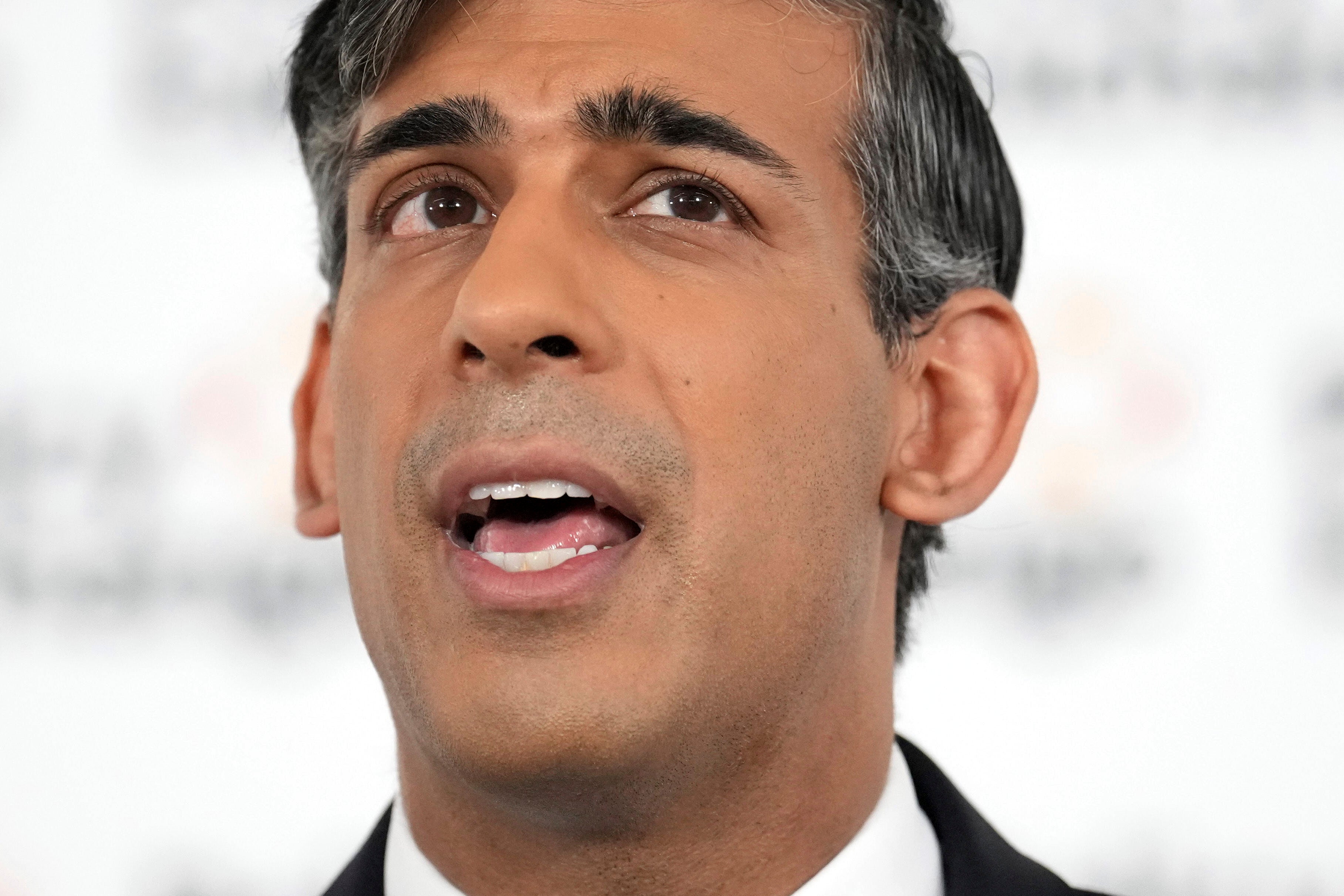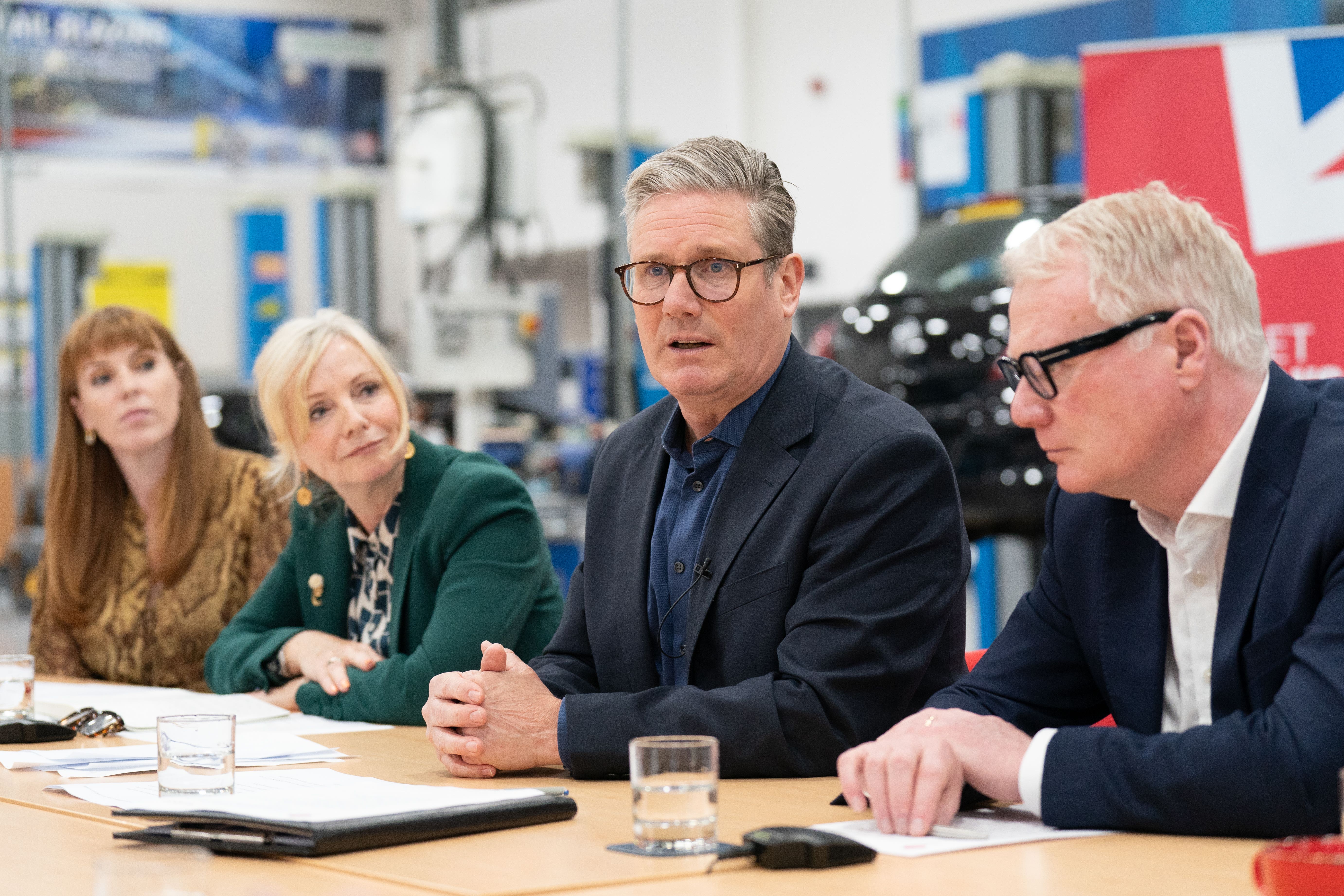Rishi Sunak pushes the nuclear general election button as he bets on national security for survival
Rishi Sunak fired the starting gun on the long election campaign with a warning that the world is going through its most dangerous period since the Cold War


Rishi Sunak framed himself as the only man who can lead Britain through the “most dangerous period” for the world since the end of the Cold War as he made a desperate plea to voters to get behind his plan.
In what was in effect the opening salvo for a long general election campaign, the prime minister’s major speech in central London laid out his preferred battleground of defence and national security.
Citing the danger facing the UK, Mr Sunak said: “Putin’s recklessness has taken us closer to a dangerous nuclear escalation than at any point since the Cuban missile crisis.”
But his keynote speech left many Tory MPs feeling flat because of a lack of new initiatives to tackle the major threats posed by China, Iran, Russia and North Korea – whom he described as the “axis of authoritarian states” undermining freedoms and security.
Meanwhile, Labour were bemused by the Tories relying on defence and national security after 14 years which have seen cuts to the army and the Royal Navy.
Shadow health secretary Wes Streeting told The Independent that Labour is “happy” for the election to be fought on national security grounds. Sir Keir Starmer underlined his party’s election fighting machine by holding a summit with the 11 regional mayors who won in the local elections.

But with many polls still putting Labour more than 20 points ahead of the Conservatives, Mr Sunak has been urged to use desperate measures to turn his party’s fortunes around.
The speech appeared to be an attempt to change the narrative and focus the minds of the general public on the threats the country is facing.
The prime minister framed the next five years as “more important than the last 30” and hinted at his own anxiety, saying he felt “a sense of urgency”.
He said: “At some point, in the second half of this year, we will all go to the polls and make a choice. Not just about Conservatives vs Labour. Or Sunak vs Starmer. It will be a choice between the future and the past. I remain confident that my party can prevail.
“Not because of our record alone, but because we will be the only party really talking about the future and not with vague, lofty platitudes. But with bold ideas and a clear plan that can change our society for the better and restore people’s confidence and pride in our country. I feel a profound sense of urgency.
“Because more will change in the next five years than in the last 30. I’m convinced that the next few years will be some of the most dangerous yet the most transformational our country has ever known. So the question we face today is this: Who has the clear plan and bold ideas to deliver a secure future for you and your family?”

Listing the dangers the world now faces he highlighted how war has come to Europe with Russia’s invasion of Ukraine.
He went on: “War rages, too, in the Middle East as Israel defends itself not only against the terrorists of Hamas but a barrage of missiles fired – for the first time – directly from Iran. Right now in Africa, conflicts are being fought in 18 different countries. “
However, critics inside and outside his own party were left unimpressed.
Former home secretary Suella Braverman, who he sacked last year but has been accused of plotting to replace him, posted on X (formerly Twitter): “If we are serious about national security we must: 1. Declare China a hostile state and list it on the Enhanced tier of the Foreign Influence Register; 2. Proscribe the Iranian Revolutionary Guard – the chief sponsor of global terrorism; and 3. Increase defence spending to over 3 per cent of GDP.”
Another senior Tory messaged: “It was just more blah, blah, blah.”
Yet another added: “What about increasing defence spending above the reheated 2.5 per cent Boris announcement a few years ago?”
And, picking up on Mr Sunak’s claim that artificial intelligence provides “a major opportunity as well as threat”, another senior Tory sarcastically suggested he “is afraid of attacks by Daleks”.
Speaking to The Independent ahead of the speech, shadow health secretary Wes Streeting expressed surprise over the prime minister claiming the Labour Party would undermine defence by not committing to the increase in spending to 2.5 per cent of GDP by the end of the decade.
He said: “We’re not the people who left the country with the smallest army since the Napoleonic war. We're not the people who left the navy, and they RAF short-staffed and short of planes and boats.
“So if the Conservatives want the next election to be a debate about who can be trusted with national security we will happily have that argument with them.”
Meanwhile, Mr Sunak will make a bid to win back the farming vote amid concerns that they are abandoning the Tories in key rural seats.
The push by the government follows an alarming survey by the NFU which revealed confidence in the farming sector is at an all-time low with 7,000 agricultural businesses shutting following 2019 and Brexit.
Along with 18 months of unprecedented wet weather post-Brexit measures including trade deals with Australia and New Zealand as well as the phasing out of the EU subsidy system have hit the sector, according to the NFU.
The prime minister will tomorrow tell the second Farm to Fork Summit at Downing Street tomorrow that the UK needs to reduce its reliance on overseas fruit and vegetables and back British producers.
It comes as the first UK Food Security Index published to ensure the government and sector is resilient to unexpected shocks to the market and extreme weather
This follows a major package of support announced by the prime minister at the National Farmers Union annual conference to increase innovation and automation in farming.
Join our commenting forum
Join thought-provoking conversations, follow other Independent readers and see their replies
Comments
Bookmark popover
Removed from bookmarks